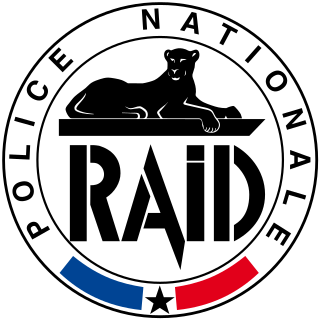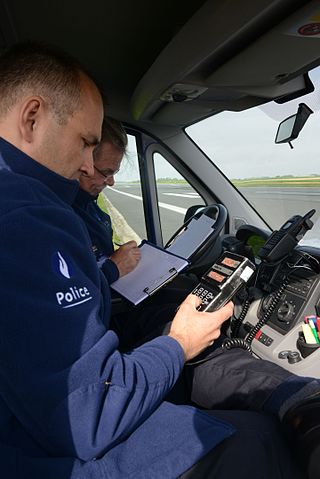The French Armed Forces encompass the Army, the Navy, the Air and Space Force and the Gendarmerie of the French Republic. The President of France heads the armed forces as Chief of the Armed Forces.

Military police (MP) are law enforcement agencies connected with, or part of, the military of a state. In wartime operations, the military police may support the main fighting force with force protection, convoy security, screening, rear reconnaissance, logistic traffic management, counterinsurgency, and detainee handling.

The GIGN is the elite police tactical unit of the National Gendarmerie of France. Among its missions are counterterrorism, hostage rescue, surveillance of national threats, protection of government officials, critical site protection, and targeting organized crime.

The National Police, formerly known as the Sûreté nationale, is one of two national police forces of France, the other being the National Gendarmerie. The National Police is the country's main civil law enforcement agency, with primary jurisdiction in cities and large towns. By contrast, the National Gendarmerie has primary jurisdiction in smaller towns, as well as in rural and border areas. The National Police comes under the jurisdiction of the Ministry of the Interior and has about 145,200 employees. Young French citizens can fulfill their mandatory service in the police force.

Riot police are police who are organized, deployed, trained or equipped to confront crowds, protests or riots.

Law enforcement in France has a long history dating back to AD 570 when night watch systems were commonplace. Policing is centralized at the national level. Recently, legislation has allowed local governments to hire their own police officers which are called the "police municipale".

Recherche, Assistance, Intervention, Dissuasion, commonly abbreviated RAID, is an elite tactical unit of the French National Police. It is headquartered in Bièvres, Essonne, approximately 20 kilometres southwest of Paris. This is an elite police unit founded in 1985. RAID is the National Police counterpart of the National Gendarmerie's GIGN. Both units share responsibility for the French territory.

The Kosovo Police is the national policing law enforcement agency of Kosovo.

The Directorate of special units (DSU) is the police tactical unit of the Belgian Federal Police. In total, DSU consists of about 500 highly trained police officers. The centralized 50 operator small assault team of the intervention unit of the DSU is deployed in cases of terrorism, kidnappings, hostage taking and other forms of serious crime. DSU performs emergency responses, high-risk arrests and searches, observation operations, undercover operations and more.

The Gendarmerie (French) or Rijkswacht (Dutch) was the former national Gendarmerie force of the Kingdom of Belgium. It became a civilian police organisation in 1992, a status it retained until 1 January 2001, when it was, together with the other existing police forces in Belgium, abolished and replaced by the Federal Police and the Local Police.

The National Gendarmerie is one of two national law enforcement forces of France, along with the National Police. The Gendarmerie is a branch of the French Armed Forces placed under the jurisdiction of the Ministry of the Interior, with additional duties from the Ministry of Armed Forces. Its responsibilities include policing smaller towns, suburbs and rural areas, along with special subdivisions like the GSPR. By contrast, the National Police is a civilian law enforcement agency that is in charge of policing cities and larger towns. Because of its military status, the Gendarmerie also fulfills a range of military and defence missions, including having a cybercrime division. The Gendarmerie has a strength of around 102,269 people.

Law enforcement in Belgium is conducted by an integrated police service structured on the federal and local levels, made up of the Federal Police and the Local Police. Both forces are autonomous and subordinate to different authorities, but linked in regard to reciprocal support, recruitment, manpower mobility and common training.

The Federal Police, formerly known as the Policía Federal Preventiva and sometimes referred to in the U.S. as "Federales", was a Mexican national police force formed in 1999 and folded into the National Guard in 2019. It operated under the authority of the Department of Security and Civil Protection.

The Departmental Gendarmerie is the territorial police branch of the French National Gendarmerie. The Departmental Gendarmerie has regular contact with the population and conducts local policing functions throughout the French territory.

The Belgian Federal Police is the national police force of the Kingdom of Belgium. It carries out specialized and supra-local administrative and judicial police operations, and supports local police services when needed. Additionally, the Federal Police is responsible for patrolling and ensuring the safety of the country’s highways. The Federal Police has approximately 12,300 officers and civilian personnel.

Grupo de Ações Táticas Especiais, mostly known by its acronym GATE, is a special operations force within São Paulo's military police.

The National Gendarmerie of Gabon is the national police force of Gabon responsible for law enforcement in Gabon. It is under the direct command of the President of Gabon. The Gendarmerie is also in charge of the Gabonese Republican Guard.

The Algerian People's National Armed Forces (ANP) has several special forces regiments as well as several specialized regiments.















